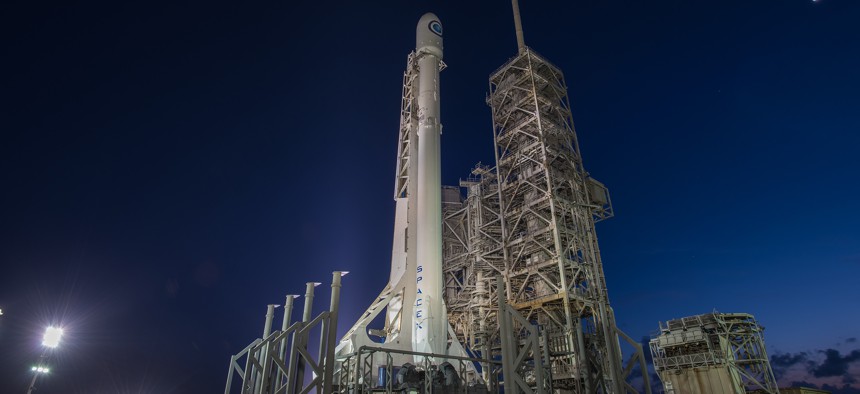
SpaceX photo
SpaceX is Launching a Spy Satellite for the U.S. Government
Elon Musk's space company has come full circle.
Elon Musk got his first taste of what goes into a top-secret space mission back in 2006, when his company SpaceX was experimenting with a new rocket at a US Air Force base. For fear that the space startup’s work would disturb efforts by competitors Boeing and Lockheed Martin to launch a secret satellite at the same site, the Air Force kicked SpaceX out.
Musk’s group decamped to the Kwajalein Atoll, located thousands of miles away in the Pacific’s Marshall Islands, where in 2008 the team would fly its first successful mission. Now, almost a decade later, the company comes full circle.
SpaceX is scheduled to launch its first top-secret payload for the National Reconnaissance Office (NRO), in a launch window opening at 7am EDT on April 30.
The NRO operates Earth-observation satellites funneling information on North Korea’s nuclear program, China’s island-building in the South China Sea, and other activities of interest to US officials.
Spy satellites are big business. While the details around these launches are highly-classified—SpaceX’s contract with the NRO was a secret for almost three years after it was awarded, and the cargo, known as NROL-76, remains a mystery to the public—the launches are estimated to cost around $100 million each.
NRO has launched 25 satellites since 2006, all of them on rockets built by the United Launch Alliance, a joint venture of Boeing and Lockheed Martin that held a monopoly on US rocket launches until SpaceX came along.
To fly classified satellites, SpaceX had to go through an onerous certification process and even sue the US Air Force in a dispute over whether bidding on a package of launches was truly competitive. After a sealed settlement, SpaceX submitted winning bids for two Air Force contracts, including a next-generation GPS satellite. This will be the company’s first flight exclusively for a US security agency.
Unlike the rocket used in its most recent launch, the Falcon 9 rocket SpaceX will use on this mission is factory fresh. That’s because the company, which predicates its business model on rocket reusability, has yet to win over defense officials on employing used boosters to fly national security satellites—although the idea of cheaper access to space is clearly appealing, if a bit terrifying.
SpaceX is planning on flying the first stage of the rocket back to Cape Canaveral for use on a future mission.
While SpaceX and ULA now have an effective duopoly over American military and intelligence work in space, they aren’t likely to be alone in a few years. Blue Origin, the space company that Amazon founder Jeff Bezos is funding to the tune of $1 billion a year, revealed this week it is working to certify its forthcoming reusable rocket, called New Glenn, to fly national security satellites.
NEXT STORY: Trump’s Next 1,360 Days







